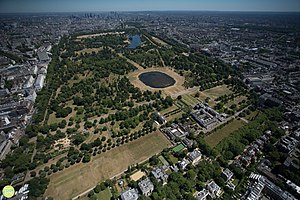
Back هايد بارك (لندن) Arabic Hyde Park AST Hayd-park Azerbaijani Гайд-парк Byelorussian Хайд Парк Bulgarian হাইড পার্ক, লন্ডন Bengali/Bangla Hyde Park Breton Hyde Park Catalan Hyde Park (parke sa Hiniusang Gingharian) CEB Hyde Park (Londýn) Czech
| Hyde Park | |
|---|---|
 Hyde Park, with Kensington Gardens in foreground | |
| Type | Public park |
| Location | Westminster, Greater London, England |
| Coordinates | 51°30′31″N 00°09′49″W / 51.50861°N 0.16361°W |
| Area | 350 acres (140 ha) |
| Created | 1637[1] |
| Operated by | The Royal Parks |
| Status | Open year-round |
| Website | www |
| Official name | Hyde Park |
| Designated | 1 October 1987 |
| Reference no. | 1000814 |
Hyde Park is a 350 acres (140 ha), historic Grade I-listed urban park in Westminster, Greater London. A Royal Park, it is the largest of the parks and green spaces that form a chain from Kensington Palace through Kensington Gardens and Hyde Park, via Hyde Park Corner and Green Park, past Buckingham Palace to St James's Park. Hyde Park is divided by the Serpentine and the Long Water lakes.
The park was established by Henry VIII in 1536 when he took the land from Westminster Abbey and used it as a hunting ground. It opened to the public in 1637 and quickly became popular, particularly for May Day parades. Major improvements occurred in the early 18th century under the direction of Queen Caroline. The park also became a place for duels during this time, often involving members of the nobility. In the 19th century, The Great Exhibition of 1851 was held in the park, for which The Crystal Palace, designed by Joseph Paxton, was erected.
Free speech and demonstrations have been a key feature of Hyde Park since the 19th century. Speakers' Corner has been established as a point of free speech and debate since 1872, while the Chartists, the Reform League, the suffragettes, and the Stop the War Coalition have all held protests there. In the late 20th century, the park was known for holding large-scale free rock music concerts, featuring groups such as Pink Floyd, The Rolling Stones and Queen. Major events in the park have continued into the 21st century, such as Live 8 in 2005, and the annual Hyde Park Winter Wonderland from 2007.
- ^ "Hyde Park History". Royalparks.org.uk. 15 December 2003. Archived from the original on 13 January 2006. Retrieved 11 December 2011.
© MMXXIII Rich X Search. We shall prevail. All rights reserved. Rich X Search
